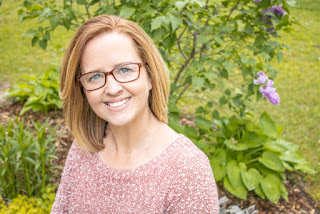Good Morning!
I'm still at my son's house in Nacogdoches, TX and will be here until next week. His trip to Daytona Beach, FL for national dance and cheer competition started out with a bang.... After driving 2+ hrs to Houston to catch a flight, it was cancelled (along with about 2500 more over the weekend!!) and he had to DRIVE 960 miles! Of course he did that in 2 days but still...You'd think the airlines would be courteous enough to let people know in advance their flights are very likely to be cancelled. UGH! Doubt I'll be flying anywhere, any time soon.
Anyway, that's about all the excitement in my family's lives for the moment. Today's guest has visited before but it's been a while so please send warm wishes to Cathy Gohlke as she talks with us about her new book, A Hundred Crickets Singing....
1. What inspired you to write A Hundred Crickets Singing? What particular issues in the time periods, as well as our current time period, prompted your interest?
I loved the characters and town of No Creek in Night Bird Calling and wanted to not only continue their story but delve into their past.
I was inspired by our country's need for racial justice, and especially by our need to know, understand and own the sins of our past in order to move forward into an honest future based on fairness, compassion, mercy, and equity.
When I learned of the treatment of "brown babies"—children born of white English girls and Black American GIs during WWII—as well as the laws prohibiting marriage between such couples, the unfairness Black American GIs experienced in the armed services and when hoping to access benefits of the GI Bill, the importance of inherited wealth and land ownership, and the effects of redlining, I felt compelled to write a story that would not only expose these things for myself and readers, but that would show the many sides of the story and the history of all that led to that era.
2. The novel is set in the 1860s and 1940s and tells the story of two young women, eighty years apart, each devoted to standing up against wrongs in her community. How are they connected?
The story is connected by fourteen-year-old Celia Percy’s discovery of an 1860s land deed in the false bottom of a hidden and forgotten trunk in the Belvidere attic. The original document deeded land to a man once enslaved by the Belvidere family—a man who never actually received ownership of the designated land. That man’s descendants still lived in No Creek in the 1940s and would greatly benefit if the land was legally transferred to them. But there were “powers that be” in the 1860s determined to prevent that land transfer, just as there are “powers that be” in the 1940s determined to prevent the same. To right this wrong and help her friends, Celia risks herself and others to complete the work courageously begun by a young woman who was her counterpart in the 1860s.
3. Your story hovers over two time periods, the Civil War and post-WWII. What about these time periods did you find intriguing?
Born on a farm that was believed by my grandaunt to be a safe house on the Underground Railroad, and having grown up in the South during the years of the civil rights movement, I’ve long been fascinated by the desperate struggle for freedom, equity, and equality of so many of our country’s citizens. I grew up hearing my grandfather’s stories of my great-great-grandfather Samuel Smith Goforth and his adventures and misadventures in the Civil War—some of which inspired my character Elliott Belvidere.
I wanted to understand how our country could fight a long and bloody civil war, free enslaved people, establish Reconstruction to the point that many Black people rose in public arenas of education, land and business ownership, and politics, and yet we still ended up with the horrors of the KKK, lynching, and Jim Crow. It made no sense to me until I studied the step-by-step policies of intentionally failed Reconstruction, the rise of the Lost Cause myth, the influence of the 1915 film, The Birth of a Nation, and finally how the benefits of the GI Bill—which launched many into the middle class and helped create inherited wealth within families—were unattainable to most returning Black military. The longer those political, legal, and social inequities continued, the more disparate our society became.
WWII was a time when our country pulled together to fight a common enemy. Our Black population hoped that by joining the fight, they, too, would win—Double V, victory at home and abroad. It broke my heart that they did not realize the dreams of human dignity and fairness that they’d fought so hard to attain for others.
I had to dig through history to learn these things. I hope that A Hundred Crickets Singing brings some of those struggles to light and enables us to continue the work that will bring victory to all.
4. How do you hope the novel, especially the struggles of your characters, will resonate with your audience?
I hope this story enables readers to look at history objectively and see the unfairness and lack of love that existed and was implemented through laws meant to separate, to benefit one group of people while keeping another group of people down and degraded. I hope seeing that will help increase understanding and compassion and will encourage readers to reach out to their neighbors and brothers and sisters in Christ as equals, heirs together, and family before God.
5. Please tell us about the historical research that went into writing this novel. Did you learn anything new that surprised you?
Much of my research had already been done in working on other books related to the Underground Railroad, the American Civil War, WWII at home and abroad, and through time spent in France and England researching WWII. Travel, books, the internet, archives from newspapers and the Library of Congress, family history, and some first-person accounts proved invaluable.
I learned that North Carolina was a much-divided state regarding Union loyalties, secession, slavery, and support for the war. One of those viewpoints is reflected in my family’s history and the archives of my great-great-grandfather, Samuel Smith Goforth, who, a captain in his militia before the war, remained loyal to the Union, refusing to carry a gun for the Confederacy, even though he was incarcerated and later sentenced to death by Jefferson Davis for this. He obtained a reprieve, thanks to a sympathetic officer who shielded him first as his noncombatant cook and later had him appointed as an ambulance driver, until his capture by Union forces. My ancestor’s story helped me understand how many different sides/viewpoints there are in war and politics—many more than history books would have us believe.
Because I could not connect the dots for how our country fought a long and bloody civil war ending slavery over one hundred years ago but continues to exist with racial disparity and social unrest today, I needed to learn how it all transpired—or didn’t. Researching the evolution of Reconstruction and how it was forced to fail; the rise of the Lost Cause myth; the far-reaching societal influence of the 1915 silent film The Birth of a Nation; the reasons Black GIs were often unable to benefit from the GI Bill; color codes, redlining, and the vital importance of land ownership and inherited wealth was eye-opening.
6. What role does faith play in your novel?
Faith journeys in the book are embodied in the lives of many characters—the evidence of things hoped for, the belief in things unseen.
In the WWII timeline: Celia’s hope to right a longstanding wrong for the sake of her friends and her struggle to wait on the Lord’s timing even though she wants to rush ahead and change things; Marshall’s belief that things will somehow work out as long as he keeps walking forward, honoring the Lord in his life, even when a multitude of things go wrong; Joe’s need for family and the realization that the connection he needs most begins with a relationship with the Lord, the only one who will never fail him or leave him.
In the Civil War timeframe: Minnie’s desire for God and goodness to prevail; her learning that sometimes faith means trusting that even though she cannot accomplish the goal, others will in God’s time; Obadiah and Martha’s hope that better days will come and their belief that things happen in God’s time when we faithfully do His will.
I find comfort and peace in knowing that while my time, opportunities, and abilities to do good are limited, God is not limited by time, humans, or history. He will accomplish His purposes in His time. Our job is to faithfully rise each day and move forward on the path before us, working with whatever gifts, opportunities, talents, and circumstances the Lord has placed in our hands. That is the faith journey I take from this book.
7. As an author, what did you particularly enjoy about crafting this story?
I loved writing Celia and Chester’s discovery of the hidden room and false-bottom trunk in the attic after the storm. I loved writing Celia’s coming of age—especially her evolving maturity in allowing the truth to unfold, and the budding of her writing dreams and romantic inclinations. I loved writing Joe’s journey to faith and his commitment to family and community. I loved writing Marshall’s determination to rise above all that held him back despite seemingly insurmountable obstacles. I loved portraying his integrity and love for his wife, his child, and the profession he chose. I loved writing of Minnie’s love for her family and her passion to help enslaved friends. I loved weaving threads from my great-great-grandfather’s Civil War adventures into the character of Elliott Belvidere, and tracing the Tate family history through the strong characters of Obadiah and Martha. All those things felt like both a moving forward and a coming home to No Creek, the small rural town and characters I’ve grown to love.
8. A Hundred Cricket Singing presents intriguing and lovable characters in heartbreaking and challenging situations—did the journeys of any of the characters surprise you as you wrote?
WWII medic Joe Rossetti grew from a minor to a major character, became integral in helping Marshall's wife, Ivy, and in locating Marshall’s child when she was later taken into a home for "brown babies" in England. If not for Joe, baby Violet may not have been found. Joe's longing and organic journey to faith and family surprised me, too.
9. Is there one character whose experience you especially identify with or one whose story grew out of lessons you have learned in your own life?
Celia. I understand her desire to make things right, her dogged determination for social justice and mercy for those she loves and champions, her belief that good should and will prevail. She doesn't always make the wisest or most informed decisions, but she does her best from a good heart. She aspires to write great stories and, despite her bent for solving mysteries, is a romantic at heart. That sounds a lot like me.
10. What did you learn by writing this novel, and what lessons do you hope your readers take away?
I learned so much about the roots and evolution of racism in our country, how we arrived where we are now in terms of disparity in incomes, land and business ownership, politics, societal mores, and attitudes. Tracing this stream—or problem—to its source was enlightening beyond measure.
I hope readers will draw conclusions that lead them to stand for those in need, vote for needed changes in our laws and zoning, and reach out to others of different races and nationalities in friendship, brotherhood, and compassion. I hope readers will view those things as natural responses to our admonition to love our neighbors as ourselves, to do justice, love mercy, and walk humbly with our God.
Four-time Christy and two-time Carol and INSPY Award–winning author Cathy Gohlke writes novels steeped with inspirational lessons from history. Her stories reveal how people break the chains that bind them and triumph over adversity through faith. When not traveling to historic sites for research, she and her husband, Dan, divide their time between northern Virginia and the Jersey Shore, enjoying time with their grown children and grandchildren. Visit her website at
cathygohlke.com and find her on Facebook at CathyGohlkeBooks
Thank you SO much Cathy for sharing your new book with us! We certainly wish you the best of luck and God's blessings with it.
Well friends, hope you enjoyed today's post and that you'll check back each week for Wednesday Words with Friends and Saturday Spotlight.
Until next time take care and God bless.
PamT
Check out Cathy's previous post HERE.




















